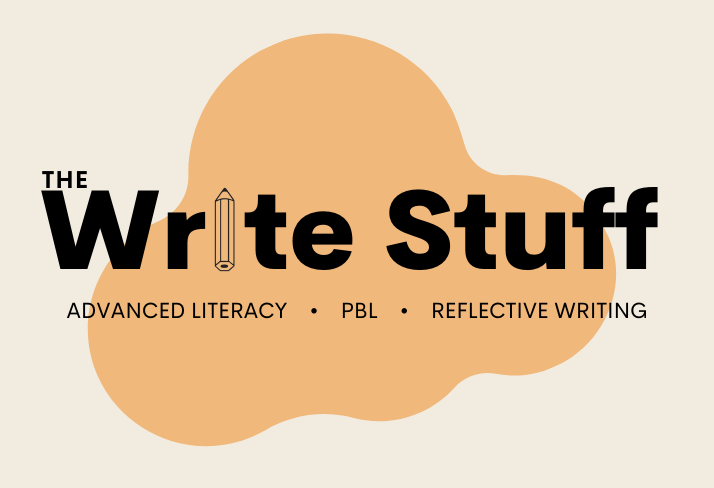|
Although personal, expressive writing is not necessarily a measurable outcome of learning, it is possibly some of the most important writing that we can ask students to do.
“Writing to learn” is a powerful concept that has long been espoused by literacy educators. In practice, writing to learn includes low-stakes writing assignments that generate authentic responses to prompts on a variety of topics. The goal of writing to learn is simply to unpack a subject, and the primary audience is the writer him/herself.
Some of the most powerful writing to learn practices include personal, expressive writing that allows us to reflect on how we are feeling and thinking. This may take the form of quick-writes in response to a question, journal entries, or letters to ourselves and others. Although personal, expressive writing is not necessarily a measurable outcome of learning, it is possibly some of the most important writing that we can ask students to do. Personal writing not only helps students develop their voice, but offers them precious space to reflect and process their feelings and thoughts, in order to feel emotionally strong and balanced. James Britton adds that expressive writing helps students academically, to “discover, shape meaning, and reach understanding.” As we plan instruction, whether remote or in-person, creating space for expressive writing is crucial, especially during times of crisis or change. During the remote learning period that has surfaced due to the COVID-19 crisis, teachers and schools across the world have worked overtime to reach and engage their students. Yet, even in cases where students appeared to have adequate access to digital devices, attendance was often lower than usual, particularly in middle and high schools in low-income neighborhoods.
Prioritizing mental health
When Principal Dr. Charles Gallo and his team at the New York City Charter High School for Computer Engineering, and Innovation in the Bronx — where I partner as an instructional and curricular coach — questioned students and their families about their low attendance, students reported feeling isolated, unmotivated, and in some cases, depressed, despairing, or scared. Dr. Gallo realized that his students’ social-emotional health and well-being needed to be tended to first. His students weren’t learning if they were not engaged, and they couldn’t engage if they were scared, depressed, or lonely. Swiftly responding, Dr. Gallo encouraged teachers to use their professional judgement to deviate from their planned units and lessons to prioritize students’ mental health and engagement by offering students opportunities to reflect and process their emotions and experiences around the pandemic. Encouraged by their principal, AECI faculty incorporated journal writing into their classes, which eventually evolved into plans for a schoolwide interdisciplinary project, grounded in personal, reflective writing. Students would craft responses to relevant essential questions, such as: How has the COVID-19 crisis had an impact on your personal life? How has it had an impact on society? What do you propose to solve or address the crisis?
Digital opportunities
In a digital world, where distance may make it challenging to interface with each student and check in about how s/he is doing, online options — such as Google Docs and Padlet — offer valuable asynchronous opportunities to read and respond to student writing with advice or supportive words. While sharing personal writing online demands trust and confidentiality, some students have shared that the experience of writing into a Google Doc (as opposed to a notebook) makes them feel braver. For students who don't have access to devices, journaling in a notebook or on paper is a terrific low-tech option for reflection. Incorporating these practices into your lessons can be as simple and informal as asking students to respond to a prompt that connects with the day’s topic. If you want to dig in further, consider some of these ideas:
An entrypoint to abstract thinking
Dr. Gallo and his faculty first incorporated journaling into their instruction as a way to help students process and express their complex and troubling feelings. Expressing oneself through writing (whether on paper, by typing a note on a phone, or working within a Google Doc) allows us to identify and understand our thoughts, which in turn, helps us become more confident, calmer, and balanced. When we reflect on and process our thinking, we can also start to make crucial connections to comprehend more abstract concepts and ideas. This is how learning begins to happen. At AECI, students’ responses to how has the COVID-19 crisis had an impact on your personal life? became an entrypoint into an exploration of the more abstract second part of the essential question — how has the COVID-19 crisis had an impact on society? In Math and Science classes, students used their writing as a springboard for interpreting data that showed how COVID-19 affected their communities. In History classes, students connected the current pandemic to the Black Plague and the 1918 Spanish Flu, using resources such as historical journals, information from the New York Times, and the Smithsonian.
A call to action
Following their investigation of the connections between personal experience and the societal impact felt by COVID-19, AECI students began to address the final essential question: What are your recommendations for addressing or solving the COVID-19 crisis? In keeping with the stages of Karen’s Hesse’s Depth of Knowledge framework and CPET’s Rigormeter, students moved from exploring their concrete realities to analyzing data and evidence, developing their own theories, and, finally, proposing a call to action. The project at AECI will culminate in a schoolwide portfolio of student writing and artwork, as well as letters to politicians that will incorporate supporting evidence from each discipline and propose solutions to elements of the COVID-19 crisis. Although AECI is focusing specifically on COVID-19, this type of interdisciplinary project can work for any relevant topic that’s applicable to your community.
For many of us educators, the demands of content, testing, or curriculum can leave us feeling as though we don't have time to incorporate personal writing into our lessons. However, when we recognize the benefits that come from creating space for students to make sense of their thoughts and feelings, we can see how this work is essential to student engagement, and how it can support the introduction of new content. When students feel emotionally balanced, personally engaged, and connected to a topic, real learning can happen — during times of crisis and every day.
|
|
The Center for Professional Education of Teachers (CPET) at Teachers College, Columbia University is committed to making excellent and equitable education accessible worldwide. CPET unites theory and practice to promote transformational change. We design innovative projects, cultivate sustainable partnerships, and conduct research through direct and online services to youth and educators. Grounded in adult learning theories, our six core principles structure our customized approach and expand the capacities of educators around the world.
|
ABOUT US
525 West 120th Street, Box 182 New York, NY 10027 416 Zankel Ph: (212) 678-3161 [email protected] Our Team Career Opportunities |
RESOURCES
Professional Articles Ready-to-Use Resources Teaching Today Podcast Upcoming PD Opportunities |
COACHING SERVICES
Custom Coaching Global Learning Alliance Literacy Unbound New Teacher Network Student Press Initiative |

























